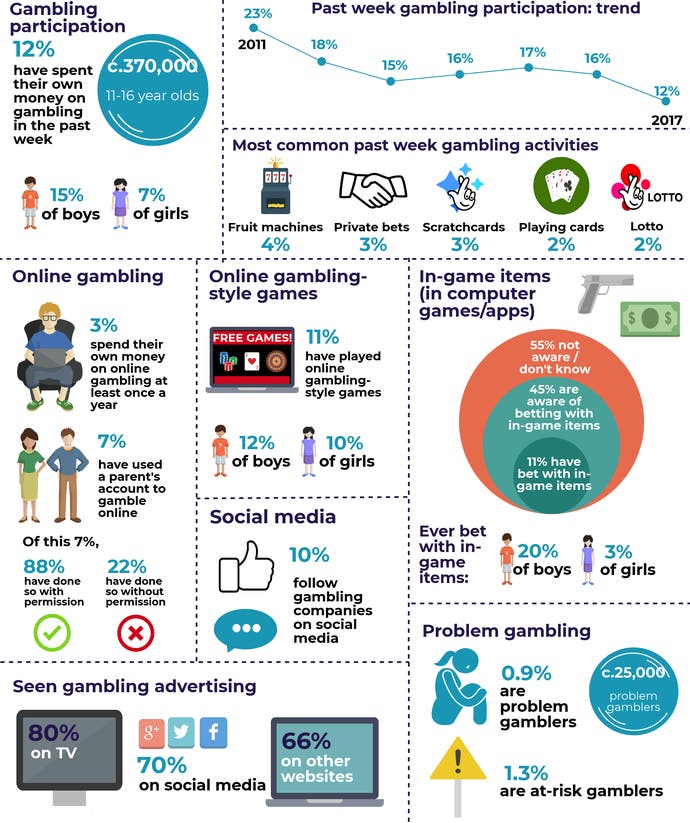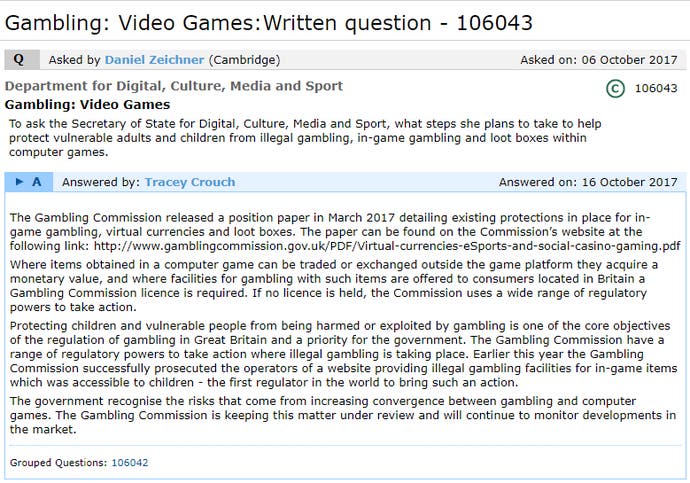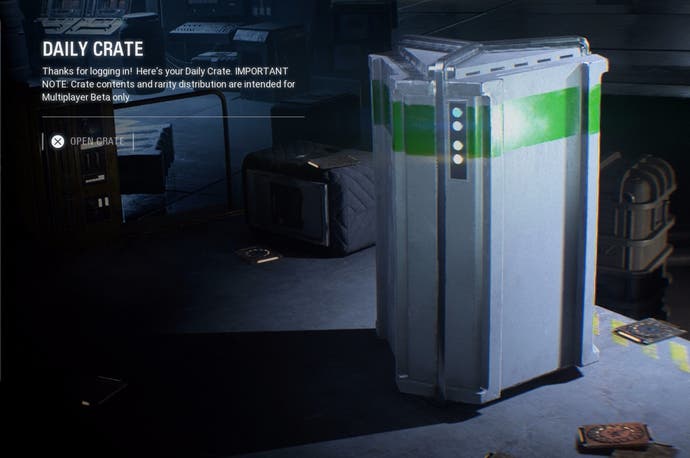The big interview: the Gambling Commission on loot boxes
"We don't yet understand enough of what the actual risks are."
Last week, independent charity Gamble Aware held its annual two-day conference in London. It focused on what's called Harm Minimisation, in particular, how to protect young people from gambling. The event was a who's who of the UK gambling industry, but there was one topic on everyone's lips: loot boxes.
The loot box debate seems to have torn the UK gambling industry apart. While many in the conference room appeared curious to learn more about the issue, others scoffed at the mere mention of "video games".
Perhaps that's why Gamble Aware wanted to address the issue head on, holding a series of panels and discussions which debated a variety of gambling related issues within video games - skin-betting, social games, esports and, of course, loot boxes.
Despite the online furore around video game loot boxes, questions remain. What is actually being done about the issue in the UK - if anything at all? After the conference, I caught up with the executive director of the UK Gambling Commission, Tim Miller, to talk about loot boxes and to find out whether we will ever see them regulated.
Where is the Gambling Commission at currently with loot boxes?
Tim Miller: The key in all of this is to recognise it's parliament rather than us that sets the legal definition of what is or is not gambling. That was set in the Gambling Act by parliament. We obviously apply that definition to our work and we, in effect, patrol the line between what is and is not gambling.

If a product crosses over that line, starts posing a threat to children and young people, then we are clear we will take action against that. A really good example was the legal action we took earlier this year in relation to the FutGalaxy website, where we prosecuted two YouTube users who were providing a facility for gambling that was parasitic off the FIFA football game.
In relation to loot boxes specifically, the key thing here is the loot boxes we've seen, none of them contain a facility to be able to cash-out within the game itself, and that's really the key thing which is preventing them from crossing that line into becoming gambling.
I'm a parent myself and actually, from a parent's perspective, it really doesn't matter whether something meets some legal definition of gambling or not. The concern that parents have, and indeed others would have, is whether there's a product out there that's potentially posing a risk to children and young people. We are clear if that risk comes from a product jumping over that line, and becoming gambling, we'll take action.
You've said yourself that the stipulation in law is that loot boxes don't count as gambling because the items received can't be "cashed out". But, as you've mentioned, third-party sites do this easily, especially when it comes to FIFA card packs. By trying to deal with these third-party sites, is it not a bit like closing the barn door when the horse has bolted? Is it not easier to nip the problem in the bud and regulate the developers themselves?

Tim Miller: We're a gambling regulator - we're the Gambling Commission. The power parliament has given us is to regulate gambling. So if it doesn't cross the line to become gambling it's not something we can use our powers for, but that doesn't mean there's not a need to take action. If there's a risk presented to children or young people then clearly it has to be dealt with. So if it's not gambling, while it may not be us who directly addresses that risk with our powers, it doesn't mean we can't raise awareness of those concerns, which is what we did back with both the paper back in 2016 and what we have been doing since.
I think it was striking at the conference, there were a range of voices, all of them sharing the same concerns we share, but the one voice that wasn't there was the voice of the computer games industry themselves. It's really important we get to hear that voice. Do they share the concerns that us and others share about the potential risks that could come from some computer games?
Do you think those developers and publishers could actually be trusted to regulate themselves?
Tim Miller: In truth, we are not computer games [experts], to say how well they can be trusted or not. I guess, just thinking of our experience in the gambling industry, we've been very clear with the gambling industry that one way to prove you can be trusted is to treat your customers well - to not take advantage of them, to understand their concerns and to act on them.
The same should apply to any product or service, and so if the computer games industry wants to look at some of the ways we've been working with the gambling industry to improve the deal consumers get, we are always very happy to share those experiences. But treating your customers well really has got to be at the heart of that.
Have any games developers of publishers been in contact to ask for advice?
Tim Miller: We've had some discussions with developers. Often, that's on the back of us raising a concern about a particular situation. For the FutGalaxy case, clearly we had discussions with developers there and they actually worked well with us on that. We've had discussions with other developers, wanting to understand a bit about our approach but the truth is we haven't had a lot of contact.
You said before that, as a parent, it doesn't matter to you whether something is defined as gambling or not if it poses a risk to your children. There's a lot of young people that play games like FIFA and Star Wars, which contain loot boxes or card parks, and there's been countless cases of these children going behind their parents' backs to spend large amounts of money. Should there not be legislation to protect them?
Tim Miller: Our powers extend to issues that are about gambling so the starting point is that test. What is really important is we see these sort of issues, where there's risks to children, not purely as a gambling issue, not even purely as a computer game issue, but as an issue of child protection.
The best way to keep children safe, and protect them, is for everyone with an interest, everyone with a product which might be accessible or marketed to children, to recognise their role in that. Actually if all of us, whatever sector we work in, whether we're a regulator, a company, a casino, whatever we are, if we can actually all work together with the shared goal to try and keep children protected then we will have greater success in making things safer for children.
You have said a few times that the Gambling Commission can only take action against something which falls into the legal definition of gambling, but loot boxes tap into the same psychological thinking as playing, say, a slot machine. Developers utilise the variable ratio schedule in the same way that casinos do. In the Gambling Commission's opinion, do loot boxes fall into gambling territory psychologically?
Tim Miller: I think in this particular environment, not just loot boxes, but if we look at free-to-play gambling-style games, social gaming, they may not amount to gambling in a legal sense, but do we really understand enough about what the consequences are? Learning those sorts of behaviours, getting involved in those sorts of activities, is an environment where the risks aren't necessarily as apparent or as clearly presented. So, with regulated gambling we have very clear rules in place to make sure there is clear messages around responsible gambling, around safe gambling.
Of course none of that exists if you open a loot box, if you play on free-to-play casino style game. There will be some of the same behaviours and same activities, yes you may not necessarily be gambling with real money, but the activities have a similar feel to you the user. We just don't quite know enough about what this could mean in the future. Are we, in effect, creating an environment where young people can be exposed to gambling-style behaviours without necessarily knowing the risks and what will that mean for the future?

You mentioned during the conference there's some research regarding young people and in-game gambling coming out next week? [This is out now.]
Tim Miller: Every year we do an extensive piece of research looking at the relationship between young people and gambling. We surveyed a couple of thousand 11-16 year-olds to understand how vulnerable they are to gambling, how they do it, where they do it, why they do it.
This year, for the first time actually, we asked a series of questions specifically around some of these areas, recognising the increasingly blurry line between computer games and gambling. We want to talk more about it. We have our questions about the number of kids who play free-to-play gambling-style games and trying to start to understand does that mean they later will gamble with real money on other products.
I think we will be careful not to draw any definite conclusions from the first year, but there's stuff in that data that raises further questions, which I think really makes the argument that we need to have much better researching in this area. A lot of research is carried out in relation to children and gambling, actual gambling in the legal sense. There's a real lack of research being done into children and gambling style activities.
At the conference a lot of people from the gambling industry approached me to ask about issues surrounding in-game gambling or for advice, because many want to help but simply just don't have a clue about video games.
Tim Miller: Lack of understanding is in itself a big risk. Just because we don't have evidence to show a link necessarily between some of these activities and people moving onto gambling doesn't mean the link isn't there. What we don't have is clear evidence to show there is no link. And my worry is the lack of evidence will cause some voices around this debate to say, "everything's fine, we don't need to do anything," and that's simply wrong. The lack of evidence in itself should be a worry for us.

So, you've said the Gambling Commission "patrols the border" and parliament sets the law, but in response to questions asked by an MP in October, Tracey Crouch said: "The Gambling Commission is keeping this matter under review and will continue to monitor developments in the market." It seems as though the government is placing the responsibility on the Gambling Commission and the Gambling Commission is placing the responsibility on the government. Who has the real authority to make a change?
Tim Miller: The issue about how to define gambling, it's set out in law, it's set out in the Gambling Act. It is the responsibility of parliament to change it. We are the statutory advisor to government and actually if we look at these things, get more research and evidence, and feel the most effective way of protecting people is through a gambling regulation response then we can consider giving that advice to government.
My view is, at this stage, we don't yet understand enough of what the actual risks are. Rather than jumping straight to "this is gambling" and "we must regulate this", both of those wouldn't necessarily be correct. What we need immediately is to know what are the risks and how do we best protect people. If protecting people means a change to the way we work, then let's look at that. If it means a change to the way computer games are regulated, then let's look at that as well. The important thing is - we do what works.
Your position paper states the Gambling Commission will have a quiet word with video game companies who "may unintentionally be enabling the criminal activity". Is that something you intend on ramping up in light of recent events?
Tim Miller: A good example, I guess, is about overriding concern to keep young people safe. There may well be circumstances where we can't use our formal, legal power to act, but that doesn't stop us making noise about this, raising concern to the right people. So certainly, if we see examples of third-party companies providing a service that may, albeit inadvertently, be helping facilitate some of these activities then absolutely we will ring that to their attention. If they are willing, we will work with them to ensure the right protections are there.
The Belgian and Dutch Gambling Commissions are investigating the issue of loot boxes. Has that put any pressure on the UK Gambling Commission or are you sticking to your own plan?
Tim Miller: As most regulators do we are always looking to learn from the experiences of our colleagues both here and around the world, but the reality is each different gambling regulator in each different country has a different legal framework to apply. So we are very much bound by the legal definition the UK parliament put in place. Obviously other countries will be bound by the rules and the legal framework put in place by their own government and parliament. Whilst we are interested in what others are doing, it doesn't automatically translate over here.
Just because Belgium may be able to take action doesn't automatically mean that we, as a gambling regulator, will be able to. Every country decides for themselves how they best regulate or control how to keep people safe.
What is the current plan to deal with loot boxes? Is there likely to be a change in the future and, if so, do you have any idea what form that action would take?
Tim Miller: We [the Gambling Commission] will continue to patrol that boundary. Products change and develop all the time and while, at the moment, we have not seen an example of loot boxes which cross that line, that's not to say there won't be a developer in the future that uses loot boxes in a way that does end up crossing that line and if they do, and that presents a risk to young people, then they can find themselves on the end of action by us. We will carry on monitoring that position and ensuring that these products do not cross that line.



